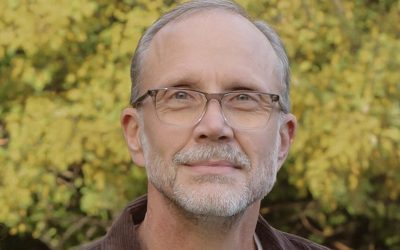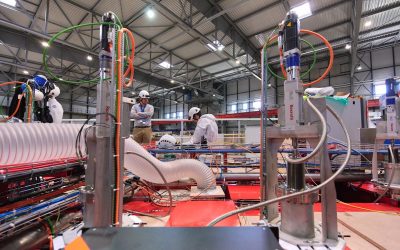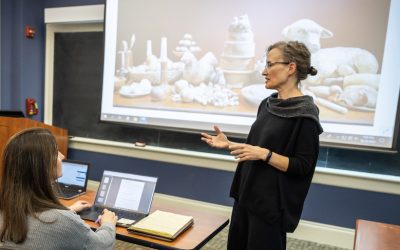Different ways to ease conflict.
Enlarge

Karen Mancinelli
May 2018 – Jonathan Golden’s list of the 10 conflict resolution lessons he gleaned from the peace process in Northern Ireland includes this one, at No. 9: “The end is just the beginning. The hard work begins the day after the peace accord is signed.”
The difficulty of that work was apparent during the annual Shirley Sugerman Interfaith Forum at Drew University, which featured two men deeply involved in the reconciliation effort: Laurence McKeown, a former Irish Republican Army soldier turned author and playwright, and Tom Kelly, an artist from Derry whose large-scale murals illuminate the walls—literal and figurative—that still divide his scarred city.
Moderated by Golden, director of Drew’s Center on Religion, Culture and Conflict, the forum was part of the two-day Dean Hopper Conference, an annual symposium on history and culture presented by Drew’s Caspersen School of Graduate Studies. This year’s theme was, “An Island at the Center of the World: Reconsidering Ireland’s Role on the Global Stage” and other speakers included Anna McGillicuddy, deputy consul general of Ireland.
Twenty years have passed since the historic Good Friday Agreement in 1998 ostensibly ended “The Troubles,” an era of protest and bitter sectarian violence that began in 1968 and left deep wounds across Northern Ireland.
Enlarge

Karen Mancinelli
McKeown, who spoke via video conference, spent more than half of that period behind bars. At 17, as a fresh IRA volunteer, he ambushed a vehicle carrying members of the Royal Ulster Constabulary—the police force of Northern Ireland—slightly wounding one of the men. The solo attack later led to a life sentence for attempted murder and bombing offenses and a daily struggle for survival in the infamous Maze Prison west of Belfast.
In 1981, McKeown joined in the hunger strikes in which Bobby Sands and nine other IRA prisoners died. McKeown himself went 70 days without eating, but when he slipped into a coma his distraught mother gained power of attorney over his care and authorized his intravenous feeding. “You did what you had to do, and I did what I had to do,” she told him.
After his early release in 1992, McKeown earned a doctorate in sociology. Since the peace accord, he has helped fellow ex-prisoners re-integrate society and has written plays, screenplays and books based on the personal struggles of people on both sides of the conflict. Question-and-answer sessions held after his plays can last longer than the performances themselves, he said. While these conversations can be strained, McKeown believes they’re an important first step toward a wider dialogue that has yet to occur in Northern Ireland.
Enlarge

Karen Mancinelli
“What I’ve found in general is that those people who were involved in the conflict … those who were in prison, those who had loved ones killed, those who were injured themselves are usually much more willing to engage in conversations than those who were less impacted,” he said.
Kelly, too, has been struck by the gulf that still exists between Catholic republicans and Protestant unionists.
The violence may have subsided, he noted, but like Palestinians and Israelis on opposite sides of the West Bank security barrier, in Derry and elsewhere in Northern Ireland, the groups have little social interaction.
The 12 murals Kelly and his fellow Bogside Artists have painted in Derry, collectively known as “The People’s Gallery,” attempts to bridge that divide, depicting key events of the conflict, from both points of view. “It is everyone’s story,” Kelly explained. “We’ve all been affected by this.”


